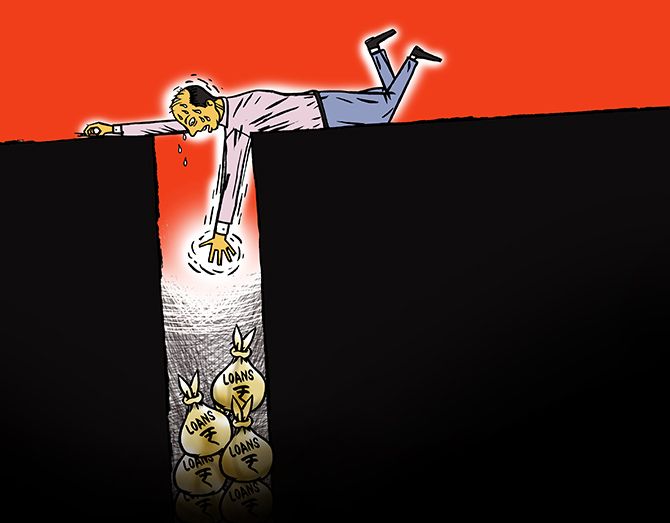 | « Back to article | Print this article |
Bankers say there is palpable fear among erring promoters that the banking system just cannot be taken for granted, and any delay in loan repayment could mean promoters losing business
Illustration: Dominic Xavier/Rediff.com

Promoters of companies in default have started seeking an audience with bankers to pay up, seeing how big-name corporate families have lost their family jewels since the Insolvency and Bankruptcy Code (IBC) came into effect.
Bankers say there is palpable fear among erring promoters that the banking system just cannot be taken for granted, and any delay in loan repayment could mean promoters losing business.
Bankers say promoters are now eager to do a one-time settlement (OTS) of their accounts, and square off their dues, without even being prompted by banks.
Bankers are also happy to go through this route as it saves them time and trouble.
“The recovery in the present context via OTS would be better and quicker than through the insolvency proceedings,” said a senior banker with a public sector bank.
So far about six-seven mid-sized cases have emerged where OTS outside the IBC has taken place and where promoters voluntarily came and asked for squaring off their dues. Haircut, or discount, given by banks ranged between 30-70 per cent in these cases.
But there are many more companies in the pipeline willing to avoid the IBC proceedings, as it is almost certain that the promoters stand to lose control of their business, say bankers.
The accounts are not large. Even though these range between Rs 50 million and Rs 30 billion, it is a good sign. Banks are busy meeting company representatives, and more often than not, the lead bank in a consortium is in charge of leading the discussions, say bankers.
While OTS schemes are not a new concept, bankers wanted to avoid it earlier as promoters tried to extract the highest possible discounts on their dues. But now with the IBC, bankers have negotiating power.
“We have received quite a few OTS requests, and we are sitting across the table to negotiate. You can say the process of paying up has started,” said a senior banker with Mumbai-based Bank of Baroda.
OTS schemes will only pick up the pace after a committee headed by Punjab National Bank Chairman Sunil Mehta proposes several asset reconstruction companies (ARCs) to be built up for bad assets of banks.
In such a set-up, expected to have private participation too, assets will be sold before promoters can possibly negotiate a decent restructuring scheme for their companies.
Making matters complicated is the Reserve Bank of India’s (RBI’s) strict one-day default norm, which is forcing banks to go for a resolution process the moment a company delays its loan-servicing obligations even by a day.
A number of private ARCs are also eyeing some of the assets that may potentially come up for liquidation.
However, so far under the IBC process, the focus is on buying the company, rather than selling the assets.
According to R K Bansal, managing director of country’s largest Edelweiss ARC, funds would be interested in picking up real, physical assets when sold on a piecemeal basis, but the IBC process involves bidders to buy the whole company and take control of it. ARCs, therefore, are so far not very active in the IBC process.
But companies are getting spooked that banks would be ready to sell their companies on a piecemeal basis if they do not pay up. More so because the RBI can come up with a rule that would ask banks to do so.
Increasingly, real assets, such as machines, factories, land, and other such collaterals, are drying up as most of the companies that may come up for the IBC process in the future are small and medium-sized enterprises, and contractors.
Even as some steel and power companies are yet to come up through the process.
For example, the engineering-procurement-construction companies may not have any real assets at all.
However, for promoters, the companies may have sentimental value and the fear that once pushed through the IBC process, they would not be given loans in future by banks. Hence, many of these companies have asked banks to settle their loans, say bankers.